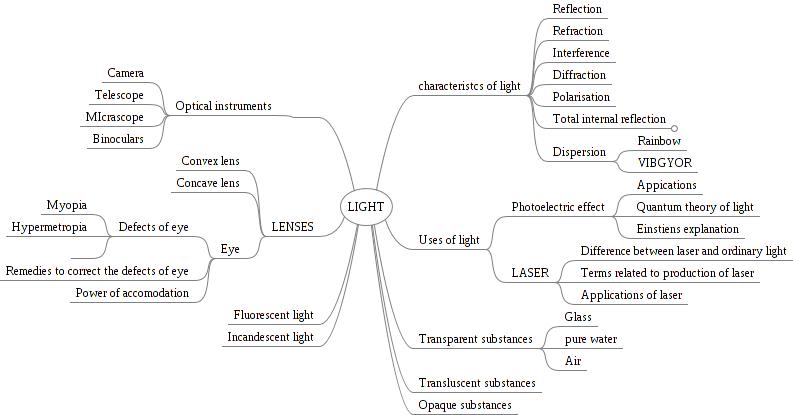Nature of Light
| Philosophy of Science |
While creating a resource page, please click here for a resource creation checklist
Concept Map
Error: Mind Map file Nature_of_Light.mm not found
Textbook
To add textbook links, please follow these instructions to: (Click to create the subpage)
Additional information
Useful websites
Reference Books
- NCERT Textbook Chapter Light
- NCERT Textbook Chapter Reflection and Refraction
- NCERT Textbook Chapter Human Eye and the Colourful World
An image of a concept map of light

Teaching Outlines
Concept #1 - Dual nature of light
Learning objectives
- It is possible to look at light and other electro magnetic radiation as a wave or as a particle known as the photon.
- Light travels as electromagnetic radiation; with waves of different wavelengths
- Light interacts with material particles in discrete packets called photons
- Different wavelengths are associated with photons of different energies
Notes for teachers
The objective here is to enable students to understand that light can be thought of as a wave or as particles. Different models of light explain different phenomena. It is important to get a sense of the history of how light was understood, how electromagnetism was understood and how light is the result of continuously oscillating electric and magnetic fields.
The following videos are useful in understanding the nature of light.
Activity No #
- Estimated Time
- Materials/ Resources needed
- Prerequisites/Instructions, if any
- Multimedia resources
- Website interactives/ links/ simulations
- Process (How to do the activity)
- Developmental Questions (What discussion questions)
- Evaluation (Questions for assessment of the child)
- Question Corner
Activity No #
- Estimated Time
- Materials/ Resources needed
- Prerequisites/Instructions, if any
- Multimedia resources
- Website interactives/ links/ simulations
- Process (How to do the activity)
- Developmental Questions (What discussion questions)
- Evaluation (Questions for assessment of the child)
- Question Corner
Concept #
Learning objectives
Notes for teachers
These are short notes that the teacher wants to share about the concept, any locally relevant information, specific instructions on what kind of methodology used and common misconceptions/mistakes.
Activity No #
- Estimated Time
- Materials/ Resources needed
- Prerequisites/Instructions, if any
- Multimedia resources
- Website interactives/ links/ simulations
- Process (How to do the activity)
- Developmental Questions (What discussion questions)
- Evaluation (Questions for assessment of the child)
- Question Corner
Activity No #
- Estimated Time
- Materials/ Resources needed
- Prerequisites/Instructions, if any
- Multimedia resources
- Website interactives/ links/ simulations
- Process (How to do the activity)
- Developmental Questions (What discussion questions)
- Evaluation (Questions for assessment of the child)
- Question Corner
Project Ideas
Fun corner
Usage
Create a new page and type {{subst:Science-Content}} to use this template
Usage
Create a new page and type {{subst:Content}} to use this template
Concept Map
Error: Mind Map file Nature_of_Light.mm not found
Textbook
To add textbook links, please follow these instructions to: (Click to create the subpage)
Teaching Outlines
Concept #
Learning objectives
Notes for teachers
Activity No #
- Materials/ Resources needed
- Prerequisites/Instructions, if any
- Multimedia resources
- Website interactives
- Evaluation
- Question Corner